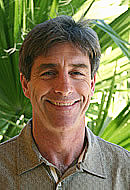Bren School Professor of landscape ecology and conservation planning and Affiliated Geography Faculty member Frank Davis has became one of the first 21 scientists to be named Google Science Communication Fellows. The scientists, chosen from universities, NGOs, and scientific entities across the U.S. and Canada, were selected for their perceived ability to communicate climate science (source).
The following is from “Making sense of science: introducing the Google Science Communication Fellows,” dated 2/15/2011 (Cross-posted on the Official Google Blog):
In an effort to foster a more open, transparent and accessible scientific dialogue, we’ve started a new effort aimed at inspiring pioneering use of technology, new media and computational thinking in the communication of science to diverse audiences. Initially, we’ll focus on communicating the science on climate change.
We’re kicking off this effort by naming 21 Google Science Communication Fellows. These fellows were elected from a pool of applicants of early to mid-career Ph.D. scientists nominated by leaders in climate change research and science-based institutions across the U.S. It was hard to choose just 21 fellows from such an impressive pool of scientists; ultimately, we chose scientists who had the strongest potential to become excellent communicators. That meant previous training in science communication; research in topics related to understanding or managing climate change; and experience experimenting with innovative approaches or technology tools for science communication. This year’s fellows are an impressive bunch:
- Brendan Bohannan, Associate Professor of Environmental Studies and Biology, University of Oregon
- Edward Brook, Professor, Department of Geosciences, Oregon State University
- Julia Cole, Professor, Department of Geosciences, University of Arizona
- Eugene Cordero, Associate Professor, Meteorology and Climate Science, San Jose University
- Frank Davis, Professor, Landscape Ecology & Conservation Planning, University of California-Santa Barbara
- Andrew Dessler, Professor, Atmospheric Sciences, Texas A&M University
- Noah Diffenbaugh, Assistant Professor, Environmental Earth System Science, Stanford University
- Simon Donner, Assistant Professor, University of British Columbia Nicole Heller, Research Scientist, Climate Central
- Brian Helmuth, Professor, Biological Sciences, University South Carolina
- Paul Higgins, Associate Director, Policy Program, American Meteorological Society
- Jonathan Koomey, Consulting Professor, Civil and Environmental Engineering, Stanford University
- David Lea, Professor, Earth Science, University of California-Santa Barbara
- Kelly Levin, Senior Research Associate, World Resources Institute David Lobell, Assistant Professor, Environmental Earth System Science, Stanford University
- Edwin Maurer, Associate Professor, Civil Engineering, Santa Clara University
- Susanne Moser, Research Associate, Institute of Marine Sciences, University of California-Santa Cruz
- Matthew Nisbet, Associate Professor, School of Communication, American University
- Rebecca Shaw, Director of Conservation, The Nature Conservancy, CA Chapter
- Whendee Silver, Professor, Ecosystem Ecology and Biogeochemistry, University of California-Berkeley
- Alan Townsend, Professor, Ecology and Evolutionary Biology, University of Colorado
At our Mountain View, Calif. headquarters in June, the fellows will participate in a workshop, which will integrate hands-on training and facilitated brainstorming on topics of technology and science communication. Following the workshop, fellows will be given the opportunity to apply for grants to put their ideas into practice. Those with the most impactful projects will be given the opportunity to join a Lindblad Expeditions & National Geographic trip to the Arctic, the Galapagos or Antarctica as a science communicator.
Congratulations to all of the fellows! And we’ll keep you posted on more ideas and tools emerging for science communication. (Posted by Dr. Amy Luers, Google.org and Tina Ornduff, Google Education.)



